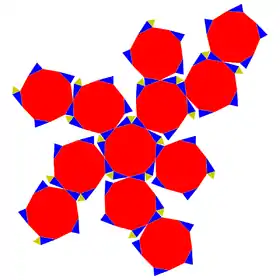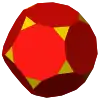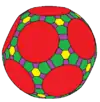| Rectified truncated dodecahedron | |
|---|---|
 | |
| Faces | 92: 20 equilateral triangles 60 isosceles triangles 12 decagons |
| Edges | 180 |
| Vertices | 90 |
| Schläfli symbol | rt{5,3} |
| Conway notation | atD |
| Symmetry group | Ih, [5,3], (*532), order 120 |
| Rotation group | I, [5,3]+, (532), order 60 |
| Dual polyhedron | Joined truncated dodecahedron |
| Properties | convex |
| Net | |
 | |
In geometry, the rectified truncated dodecahedron is a convex polyhedron, constructed as a rectified, truncated dodecahedron. It has 92 faces: 20 equilateral triangles, 60 isosceles triangles, and 12 decagons.
Topologically, the triangles corresponding to the dodecahedrons's vertices are always equilateral, although the decagons, while having equal edge lengths, do not have the same edge lengths with the equilateral triangles, having different but alternating angles, causing the other triangles to be isosceles instead.
Related polyhedra
The rectified truncated dodecahedron can be seen in sequence of rectification and truncation operations from the dodecahedron. Further truncation, and alternation operations creates two more polyhedra:
| Name | Truncated dodecahedron |
Rectified truncated dodecahedron |
Truncated rectified truncated dodecahedron |
Snub rectified truncated dodecahedron |
|---|---|---|---|---|
| Coxeter | tD | rtD | trtD | srtD |
| Conway | atD | btD | stD | |
| Image |  |
 |
 |
 |
See also
References
- Coxeter Regular Polytopes, Third edition, (1973), Dover edition, ISBN 0-486-61480-8 (pp. 145–154 Chapter 8: Truncation)
- John H. Conway, Heidi Burgiel, Chaim Goodman-Strauss, The Symmetries of Things 2008, ISBN 978-1-56881-220-5
External links
- George Hart's Conway interpreter: generates polyhedra in VRML, taking Conway notation as input
This article is issued from Wikipedia. The text is licensed under Creative Commons - Attribution - Sharealike. Additional terms may apply for the media files.